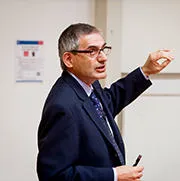22 February 2016
Full House at the Annual Higgs Lecture 2016
Professor James Bowie of the University of California, Los Angeles gave the fourth Annual Higgs Lecture to a packed theatre on Friday, 19 February. His lecture, titled “Toward quantitative folding studies of complex membrane proteins” focussed on the need to understand how proteins fold and the implications that a proper understanding of this complex and extremely difficult to study process could provide.

He explained that there are hundreds of thousands of atoms in a protein and that these all interact in a variety of ways to form the bonds that stabilise the protein in its folded state. The particular order of the amino acids is what determines the final, folded shape but there are still many, many possible conformations and, given that the proteins fold remarkably quickly, he stated that there must be some way to predict the correct conformation.
While the folding of ordinary proteins is difficult to examine, the folding of membrane proteins, which comprise 30% of proteins, presents an even greater problem. Professor Bowie explained that the environment of membrane proteins is quite complex. The proteins themselves are much more “greasy” because they do not mix well with water. This means that to investigate them, detergents must be used to shield the unstable parts from water; however this then makes the proteins unstable.
Folding must also be reversible in order to understand it better as this would allow scientist to repeatedly fold and unfold proteins and monitor the thermodynamic parameters and kinetics. So far the best model for this is bacteriorhodopsin, a protein found in bacteria that uses light energy to transport protons across the cellular membrane. According to Bowie, the pioneer in studying the kinetic forces involved in the folding of proteins is King’s own Paula Booth from the Department of Chemistry.
Professor Bowie and his team have taken this research one step further by using a mechanical method to pull the proteins apart. Initially, the researchers expected the protein to slowly unravel as they exerted more force on the helices but to their surprise they found that, instead, the protein suddenly pops apart and won’t refold unless you slightly stretch it again. This rapid folding and unfolding means that it is still a very difficult area of study; however, Professor Bowie is optimistic that one day we will understand this critical biological process.

